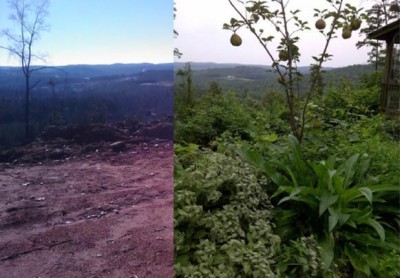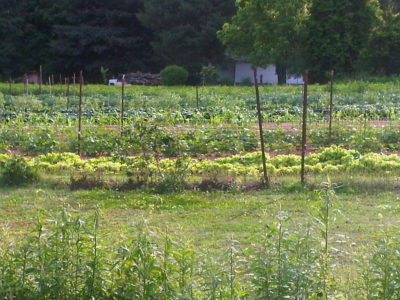Monsanto is teaming up with American Vanguard to extend a “crop protection collaboration” program. Crop protection sounds like an Earth-friendly and worthwhile project, but this is biotech giant Monsanto we are talking about – so a closer look is most definitely warranted.
Several weeks ago, American Vanguard announced that its AMVAC Chemical Corporation extended an agreement with Monsanto to “co-market” Impact, a corn herbicide, with Roundup Ready PLUS, a weed killer. American Vanguard’s Impact allegedly “compliments” the Roundup Power MAX and Roundup WeatherMax products. The chemical products supposedly enhance the control of broadleaf weeds.
A Daily Finance report about the Monsanto and American Vanguard agreement reads:
“Under this multi-year agreement, which has been extended through August 2017, Impact will be listed as an endorsed product in the platform and promoted by both companies as the qualifying post-emergent Roundup agricultural herbicide tank-mix product supported by Monsanto’s extensive Corn Incentives in the United States.”
Supposed experts described as “weed scientists” reportedly recommend that American farmers use multiple types of actions and products when thwarting weeds. The AMVAC Impact commercial weed killer is touted as an outstanding HPPF inhibitor herbicide that significantly increases weed resistance on farms.
Weeds are bad for our farms and gardens and we should pull them, right? Wrong. Permaculture expert and Secret Garden of Survival author Rick Austin is nationally renowned for his agriculture skills and insights. Austin left the corporate world behind to live off the grid in North Carolina several years back. Rick has traveled across the country to speaking engagements designed not to sell products, but to educate others about the crop growing habits of our ancestors.
In addition to being a top-selling author and staunch Libertarian, Austin is just an all-around good guy who is always eager to lend his expertise to help both the general populace and fellow writers understand how we need to rethink farming/gardening, and to warn against the use of pesticide and herbicides.
Very little information is available online about American Vanguard and their Impact product. Entering into a co-marketing agreement with Monsanto immediately made non-Earth friendly alert red flags immediately pop into my mind – so I called Rick for a weed-worthiness refresher course.
OTG: Do weeds play a valuable role in the growing process?
Rick: The war against weeds makes no sense. The “weeds are bad and gotta be pulled” argument is just plain wrong. The truth of the matter is that weeds are nature’s way of taking soil that is depleted and without ingredients and micro-organisms. Nature hates a vacuum. In the natural course of things, weeds are the first thing to go into an area that has been devastated after a fire or clear-cutting, for example. Weeds live and thrive when no other plants will. A difficult bare patch of soil with an annual crop like corn, needs the benefits of the natural role weeds play. Weeds are stronger and healthier, and try to take the crappy soil and turn it into something that other plants can use in the future. They break up soil that may be too hard or compact. They make the soil better and allow water to get into the ground.
New Survival Seed Bank™ Lets You Plant A Full Acre Crisis Garden!
OTG: What happens next in the garden or on the farm when weeds are left to grow freely, as nature intended?
Rick: Then micro-organisms are key to releasing nutrients on the plants. Weeds are pioneer plants and come in first; they will die off and create mulch for succession plants. It is on the edge of forest, where the field meets the forest, where all of the cool stuff is going on. Medicinal herbs often grow there and small plants, and then taller structures like berries and then eventually trees and fruit trees, pines and oaks.

food forest before and after
OTG: So we should not pull weeds? My husband wants me to get on that tedious task this weekend. I sure would love to be able to say “no” and be able to back it up with a scientific reason.
Rick: When people pull weeds, they are doing exactly the opposite of what they need to do to make the soil become more fertile. In permaculture, or a food forest, weeds are still flowering when everything else has gone. If you pull out the flowering weeds, then there is no reason for predatory wasps to show up. Pests are most attracted to crops without predators, like wasps nearby.
Years back, I had some potato plants that were going to go bad if not planted very quickly. I did it just like everyone else, in straight rows with just a single crop planted in the row. When all the potato leaves were gone, my first thought was that is was deer. But, as I walked down rows one through three, I noticed the exact same thing. By the time I got to the fourth row, I saw that the plants were covered in beetles. The bugs went right down the line and munched on each potato plant. Had I planted then like I do now, with a food forest design, the bugs would have had to search longer in between rows to find their desired crop and been exposed to a host of natural predators, killing many of the bugs which had feasted upon my potato plants.
OTG: Many backyard gardeners and farmers have been conditioned to believe they have to use pesticides and herbicides to protect their crops. Biotech companies like Monsanto have made billions of dollars from the sale of chemical products, such as RoundUp Ready. Is your message to America that it is time to throw out everything they have been led to believe and live a weed-pulling-free life?
Rick: Nature doesn’t have pesticides or fertilizers, and we have had berry bushes and fruit trees without any help or intrusion from man for centuries. Turning soil over is another bad idea, because it loses nutrients. Planting in straight rows is also not a good idea. Mechanized farming has been around since about WWII. Chemical companies which made bombs for the war effort grew fast and ultimately found themselves with nothing to do after World War II ended – then along came fertilizer. Chemical companies told farmers that fertilizer would help grow more plants more quickly in the same space, instead of letting nature take its course.
The process of mono crops planting, where everything is harvested at the same time, grew and machinery made it easier for man to work the land. A smorgasbord was created for bad bugs to go in and devastate those crops, and without weeds or herbs for predatory bugs to land on, they overran the crops.
OTG: Do you have any advice for folks who may live in areas where a free-flowing natural garden, complete with weeds, will get them in trouble with the local zoning office of a HOA?
Rick: I have been asked about this during multiple speaking engagements. HOAs may have restrictions against gardens, but not against trees or bushes. People who live under such guidelines should be able to create one guild of plants with fruit trees, berry bushes, and herbs without it violating the garden rule or even looking like a typical growing plot. Then they could put ground cover, like clover and strawberries, around it and interplant annuals with perennials around the crops.
OTG: What do you think about Monsanto’s Roundup Ready?
Rick: Monsanto products run counter to nature. They have created a self-fulfilling prophecy and reason for existence. Weeds resistant to Roundup now require the use of even more of the herbicide to kill the weeds. Those chemical are going into plants, soils, and the foods that we eat.
OTG: The predatory nature of Monsanto GMO seeds and chemical pesticides and herbicides makes me feel as if I will need to grow my garden in a greenhouse to prevent any non-organic seeds or chemicals from blowing in, being dropped by a bird, or pollinated by a GMO-infused bee from winding up in my harvest. Concerns about chemicals impacting my garden due to flooding or soil contamination also make me feel that a greenhouse would offer the best protection for my family’s food supply.
Rick: Wow, how ironic you should mention greenhouses. My next book, Secret Greenhouse of Survival, touches upon just that. The camo greenhouse will look like a typical porch. It uses gray water to provide heat and doesn’t look like a greenhouse. There’s no huge and expensive glassed-in area. The greenhouse offers a way to grow food all year around and get seeds started. It is completely disguised and utilizes early raised beds and planters all the way around. Here in North Carolina we have been able to grow exotic plants like coffee trees and citrus in the secret greenhouse.
Rick’s Secret Greenhouse of Survival is not yet completed, but he will be discussing the topic of the upcoming Doomsday Expo in Denver. As previously reported by Off The Grid News, the prepper event is being touted as the largest ever such gathering in America and will be used as a casting call for Doomsday Preppers. Austin does not use electricity in his home, at all. He utilizes solar power to create heat and humidity in the secret greenhouse. The room can reach 120 degree temperatures via the power of the sun. The hot and moist air generated in the greenhouse can also be used to heat the home. Last year, when his region of North Carolina had an unseasonably cold winter, Rick was able to only light his wood stove 10 ten times due to the heat pushed indoors via the greenhouse.
 Off The Grid News Better Ideas For Off The Grid Living
Off The Grid News Better Ideas For Off The Grid Living





